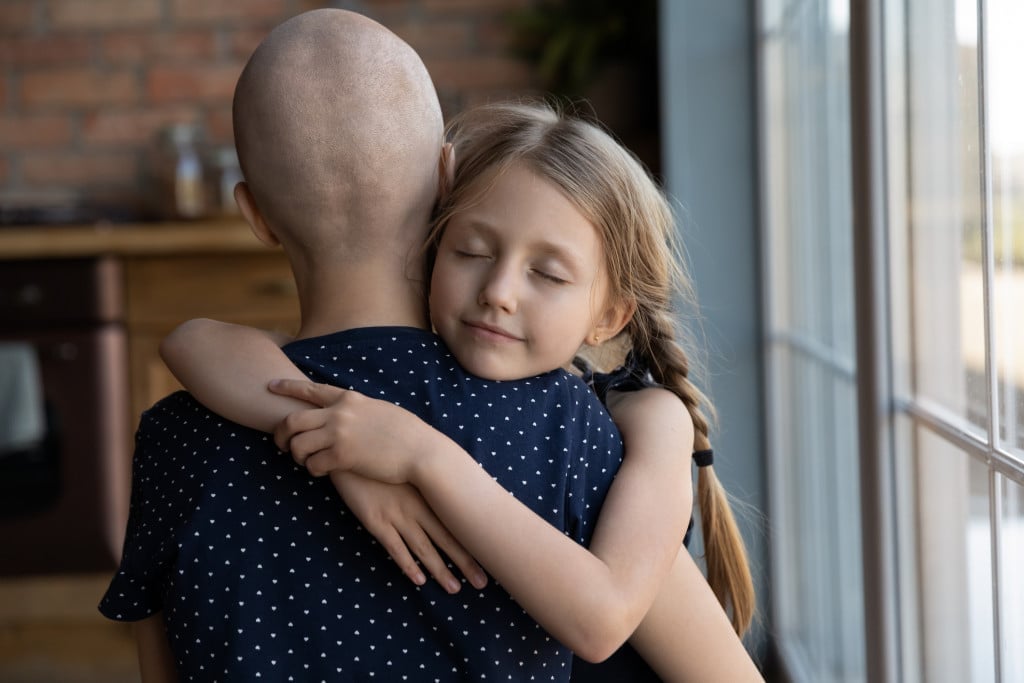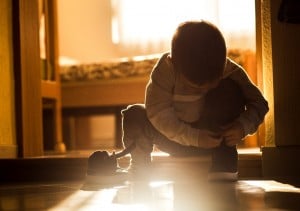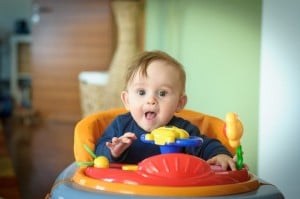If you’re a parent diagnosed with cancer, the first piece of advice I can give is not to keep your diagnosis a secret from your child. Even though you may not want to hurt or worry your child, they will value your honesty over your secrecy. Try to find a good time – free from distractions or interruptions – to sit down and explain things to your child.
In 2013, I was diagnosed with Stage II cervical cancer. Within 24-hours of my diagnosis, I was in surgery to have a radical hysterectomy to save my life. Cancer took a tremendous toll, not only on my body and mind but on my family. At the time of my diagnosis, my husband and I had our two-year-old son. I could not hold and care for him while I recovered and depended on family and friends’ help. It was a challenging time to help our son understand these changes and my slow recovery. I have since learned valuable tips on helping a child cope when mom – or dad – has cancer.
Explain your cancer.
Once you’ve told your child you have cancer, you should explain your diagnosis. Tell your child what type of cancer you have and where it is in your body – or on the body of a toy – to help them understand better. The more information your child has about your cancer, the more they can understand it. Avoid using nicknames for your cancer because that can make your child more confused about your condition or more worried if you aren’t truthful with them. The more your child understands what cancer is, the less confused and afraid they will be.
Your child might think they can “catch” cancer.
Your child may become worried your cancer is contagious. They may be scared they’ll catch cancer or be scared the other parent might catch it. Explain to your child cancer isn’t like an ear infection or the flu they might catch at school. It can’t spread from person to person. Assure them they won’t get sick from hugging or kissing someone with cancer.
Tell your child how their life will be affected.
Children thrive on routine. That’s why many parents give them set bedtimes and dinnertimes. Routine is why schools start at the same time every day. But your family’s routine will change. It may become harder for you to perform duties around the house. Treatments and hospitalizations may mean you might not be able to pick up your child from school. You might not be able to make it to all their ball games. Your child will be disappointed, just as you will be, but being honest with your child is what’s most important. Explain to your child how their life may be affected, so they’re not surprised by change.
Inform your child of the side-effects of your treatment as well. Tell them you might need more rest than before or that your hair might begin to fall out. You don’t want to overwhelm your child with information about your cancer and the treatment, but the more they know, the less confusing and mysterious your condition will become to them.
Your child might blame themselves.
It’s not uncommon for children of all ages to blame themselves for their parent’s cancer. They might believe your cancer is a form of punishment for being ungrateful or for being a bad kid. As parents, we know this could not be farther from the truth, but your child – no matter their age – may need reassurance. Explain to them how cancer is no one’s fault and sometimes things happen outside of their control and everyone else’s control, too.
Show them how they can help.
Your child may feel guilty they can’t help you recover faster or better. Show them how they can help you through helping around the house or making you something nice such as a handmade card. Let your child know how much you value what they’re doing for you.
Patience and understanding are key.
Being understanding and supportive of your child is very important. Your child may not be able to articulate their feelings to you, but they may show their emotions through their actions. Be patient with their behavior and continue to be honest with your child about your condition. Ask your child how they’re feeling and coping. Show them they’re important.
It may be hard to be a shoulder to lean on for your child as you’re going through your treatment, but having support and trust from you will be invaluable to your child. If your child is having difficulty coping, offer to find them a child psychiatrist they can confide in.
I developed PTSD (post-traumatic stress disorder) and body dysmorphia after my treatment. Going to counseling helped me through the emotional scars and trauma. Professional psychiatry can help your child talk and work through the complex emotions they’re experiencing.
Be prepared for difficult questions.
A question you should be prepared to answer is, “Is Mom (or Dad) going to die from cancer?” Be as honest as you can about your diagnosis. If you haven’t been told your time is limited, tell your child you won’t die anytime soon. Explain that sometimes people die from cancer, but doctors can also help people beat cancer. Give your child hope and optimism. Explain that they shouldn’t be worried about the future and instead focus on what is happening now to ease their anxiety over your cancer. There is no shame in answering “I don’t know” if your child asks you a question about your cancer you don’t know the answer to.
Spend time together.
You should spend as much time with your child as you can. You might not always be physically or mentally capable of partaking in activities with them, but you should not miss a moment when you feel physically and mentally able. Spending time with your child will help both of you feel happier and give you both a sense of normalcy.
I know parenting while fighting cancer can seem like an overwhelming challenge, but it isn’t. Be patient and honest with not only your child but with yourself.






























